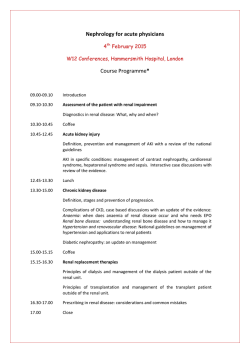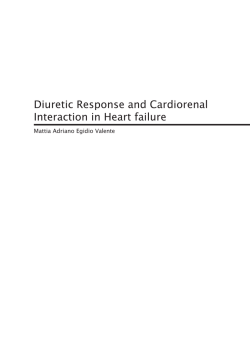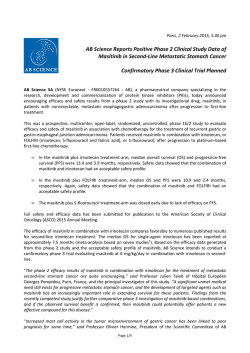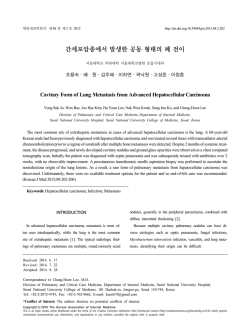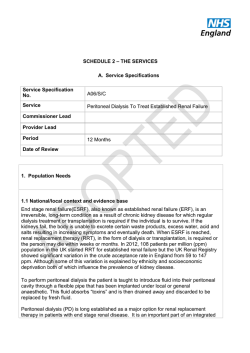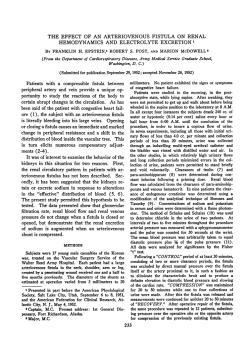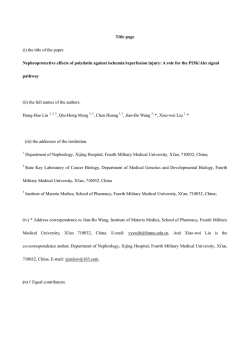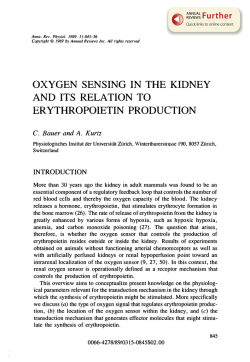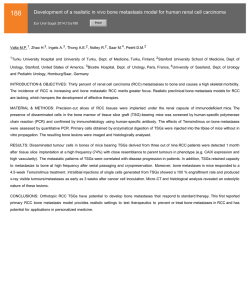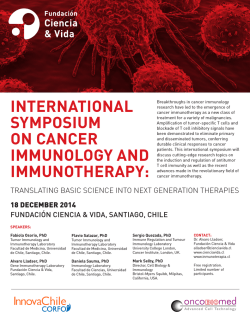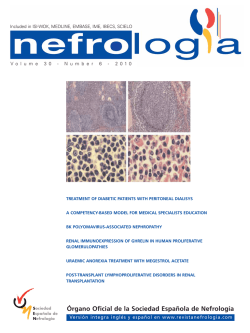
completed.
TUMORES UROLÓGICOS INFRECUENTES Carmen Beato Zambrano. Hospital NISA Sevilla-Aljarafe Los tumores urológicos son, per se, un grupo infrecuente de tumores… NEOPLASIAS INFRECUENTES DE LA PRÓSTATA TUMORES EPITELIALES DE LA PRÓSTATA GUIDELINES An Open Label, Multi-center Pasireotide Roll-over Protocol for Patients Who Have Completed a Previous Novartis-sponsored Pasireotide Study and Are Judged by the Investigator to Benefit From Continued Pasireotide treatment. TUMORES INFRECUENTES DE VEJIGA TUMORES EPITELIALES DE VEJIGA GUIDELINES 12 EC ABIERTOS EN ESPAÑA, EN TODOS ES CRITERIO DE INCLUSIÓN “CARCINOMA UROTELIAL DE VEJIGA” TUMORES INFRECUENTES DE RIÑÓN TUMORES EPITELIALES DE RIÑÓN GUIDELINES For patients with advanced RCC we administer molecularly-targeted therapy rather than immunotherapy or chemotherapy because the limited data suggest that immunotherapy or chemotherapy has little impact on the outcomes of these patients GUIDELINES For patients with advanced RCC we administer molecularly-targeted therapy rather than immunotherapy or chemotherapy because the limited data suggest that immunotherapy or chemotherapy has little impact on the outcomes of these patients GUIDELINES For patients with advanced RCC we administer molecularly-targeted therapy rather than immunotherapy or chemotherapy because the limited data suggest that immunotherapy or chemotherapy has little impact on the outcomes of these patients NON-CLEAR CELL HISTOLOGY HAS A WORSE PROGNISTIC…? A total of 49 studies comprising 7771 patients were included in the analysis. Of these, 1244 patients (16.0%) had non-ccRCC, 6300 (83.1%) had ccRCC, and 227 (2.9%) had sarcomatoid tumours. The overall response rate for non-ccRCC with targeted agents was 10.5%. In studies directly comparing non-ccRCC and ccRCC, there were significantly lower response rates for non-ccRCC (odds ratio for response: 0.52; 95% confidence interval, 0.40–0.68; p < 0.001). For non-ccRCC treated with targeted agents, median PFS and OS were 7.4 and 13.4 mo, respectively; for patients with ccRCC, these were 10.5 mo and 15.7 mo, respectively (p value for difference <0.001 for both parameters). SHOULD I TREAT IT LIKE A POOR-RISK CC RENAL CANCER…?? ARE ALL NCC RENAL CANCER THE SAME?? Stamatakis L, Singer EA, Siddiqui MM, et al. Phase II trial of bevacizumab and erlotinib in patients with advanced hereditary leiomyomatosis and renal cell cancer (HLRCC) or sporadic papillary renal cell carcinoma. Eur J Cancer 2011:Abstr 2753 Srinivasan R, et al. Mechanism based targeted therapy for hereditary leimyomatosis and renal cell cancer and sporadic papillary renal cell carcinoma: interim results from a phase 2 study of bevacizumab and erlotinib (abstract 5). EORTC-NCI-AACR Symposium on Molecular Targets and Cancer Therapeutics (2014) ARE ALL NCC RENAL CANCER THE SAME?? Chittoria N, Zhu H, Choueiri TK, et al. Outcome of metastatic sarcomatoid renal cell carcinoma (sRCC): Results from the International mRCC Database Consortium. ASCO Meeting Abstracts 2013; 31:4565 Michaelson MD, McDermott DF, Atkins MB, et al. Combination of antiangiogenic therapy and cytotoxic chemotherapy for sarcomatoid renal cell carcinoma. ASCO Meeting Abstracts 2013; 31:4512 COMPLETED Prospective Randomized Phase-II Trial With Temsirolimus Versus Sunitinib in Previously Untreated Patients With Advanced or Metastatic Non-Clear Cell Renal Carcinoma A Randomized Phase II Study of Afinitor (RAD001) vs. Sutent (Sunitinib) in Patients With Metastatic Non-Clear Cell Renal Cell Carcinoma (ASPEN) Phase II Trial of Sunitinib Malate (Sutent) Therapy in Patients With Advanced Non-Clear Cell Renal Cell Carcinoma Everolimus Versus Sunitinib Therapy in Patients With Advanced Non-clear Cell Renal Cell Carcinoma To assess the efficacy and safety of RAD001 (everolimus) in non-clear cell renal cell carcinoma RAPTOR: RAD001 as Monotherapy in the Treatment Papillary Renal Cell Tumors Program in Europe (MACS0460) of Advanced COMPLETED A Study to Assess the Safety, Pharmacokinetics and Effectiveness of AGS-16C3F Monotherapy in Subjects With Renal Cell Carcinoma(RCC) of Clear Cell or Papillary Histology Study of Capecitabine in Metastatic Non-clear Cell Renal Cell Carcinoma (RCC) Patients Pemetrexed Plus Gemcitabine in Renal Cell Cancer CLOSED POOR RECRUITMENT A Phase II Study of Bortezomib (Velcade ) Administered as a Single Agent in Metastatic Non-Clear Cell Renal Cell Carcinoma (RCC) Patients Phase II Study of Sunitinib in Metastatic Renal Cancer With Non-clear Cell Histology TUMORES INFRECUENTES DE TESTÍCULO TUMORES DE TESTIS Y PARATESTIS ENSAYOS ABIERTOS EN EL MUNDO URETHRA, URETERAL AND RENAL PELVIS CANCER TUMORES EPITELIALES DE PELVIS, URETER Y URETRA CÁNCER DE PENE TUMORES EPITELIALES DEL PENE, INCIDENCIA 0.62/100.000/AÑO TIP is a reasonable first-line treatment for patients with metastatic penile cancer, including palliative treatment of patients with distant metastases. 5-FU + cisplatin has been used historically for metastatic penile cancer and can be considered as an alternative to TIP. Bleomycin-containing regimens are associated with unacceptable toxicity and are no longer recommended. No standard second-line systemic therapy exists. A clinical trial is preferred. In select patients, paclitaxel or cetuximab may be considered, especially if not previously treated with a similar class of agent. NOT YET RECRUITING CLINICAL TRIALS A Randomized Phase II Study to Evaluate the Efficacy and Safety of Cetuximab in Metastatic Penile Carcinoma. NOT YET RECRUITING. International Penile Advanced Cancer Trial (International Rare Cancers Initiative Study) (InPACT). NOT YET RECRUITING Phase II Study of the Pan-HER Inhibitor Dacomitinib (PF-00299804) for Patients With Locally Advanced or Metastatic Squamous Cell Carcinoma of the Penis. NOT YET RECRUITING. Phase II Study With Pazopanib and Weekly Paclitaxel in Metastatic or Locally Advanced Squamous Penile Carcinoma Patients Previously Treated With Cisplatin Based Chemotherapy. NOT YET RECRUITING COMPLETED CLINICAL TRIALS Phase II Study of Irinotecan (CPT 11) and Cisplatin (CDDP) in Metastatic or Locally Advanced Penile Carcinoma. COMPLETED. Phase II trial to study the effectiveness of docetaxel in treating patients who have locally advanced or metastatic penile cancer. COMPLETED. Phase II trial to study the effectiveness of interferon alfa plus isotretinoin in treating patients with recurrent cancer. COMPLETED. Vaccine therapy and detection of immunologic responses with human papillomavirus 16 e6 and e7 peptides in patients with metastatic or locally advanced cervical cancer. COMPLETED. Phase I trial is studying the side effects and best dose of MS-275 in treating patients with advanced solid tumors or lymphoma. COMPLETED A Phase II Study of (Neoadjuvant Chemotherapy Trial Prior to Extirpative Surgery) for Clinical Stage TanyN2-3M0 Squamous Cell Carcinoma of the Penis. COMPLETED CONCLUSIONES: CANCER IS A MOLECULARLY HETEROGENEUS DISEASE Dada la gran heterogeneidad del cáncer, más allá de la frecuencia de presentación de cada patología, es necesario un cambio de paradigma en el diseño de los EC, desde la inclusión según parámetros clínicos, anatómicos o histológicos hacia la inclusión según parámetros moleculares. Esto beneficiará especialmente a los tumores infrecuentes. DETERMINACIÓN DE VÍAS DE EXPRESIÓN EN TUMORES INFRECUENTES Mientras tanto, inicidir en la necesidad de derivar a los pacientes a centros de referencia, donde se secuencie su ADN y se ofrezcan terapias dirigidas. Y crear registros de tumores donde esta experiencia pueda quedar reflejada y ayude al tratamiento de casos similares.
© Copyright 2026
